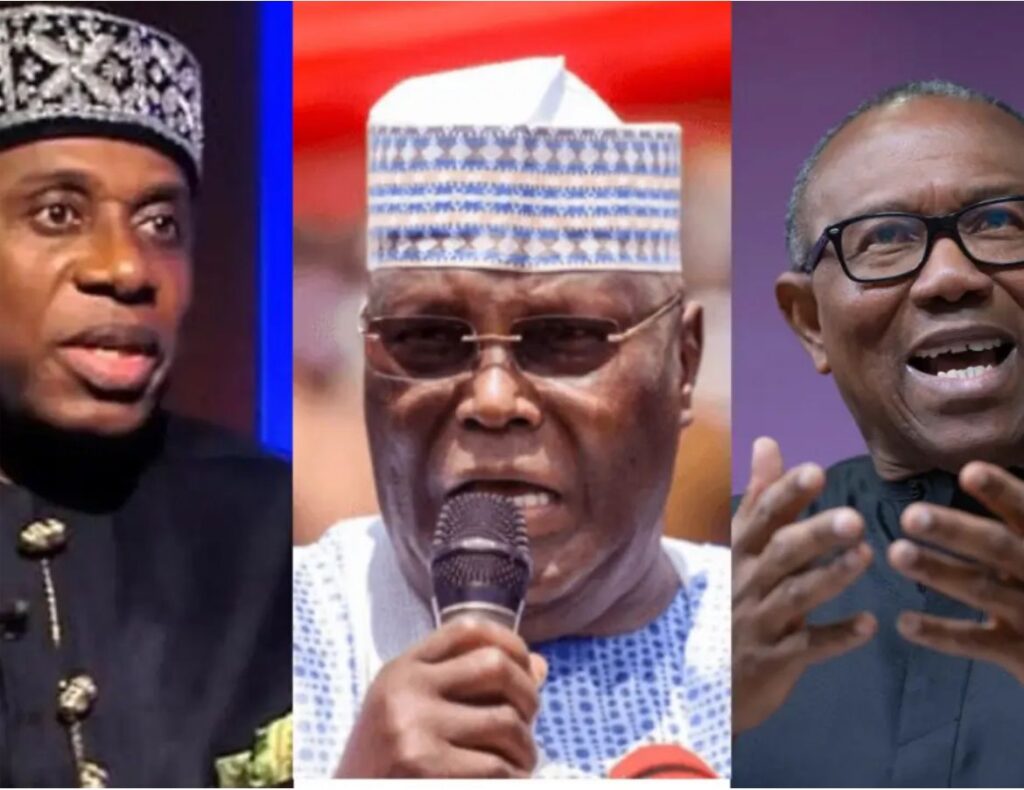The unfolding 2027 presidential race within the newly formed African Democratic Congress (ADC)-led coalition is already causing internal friction, as key political figures like Peter Obi, Atiku Abubakar, and Rotimi Amaechi jostle for dominance.
With just under two years to Nigeria’s general elections, political ambition is testing the coalition’s unity, sparking heated debates, factional loyalty, and growing discord among stakeholders and supporters.
While the ADC presents itself as a third-force alternative to the ruling All Progressives Congress (APC) and the Peoples Democratic Party (PDP), the alliance is now facing a greater threat from within: competing interests and the absence of a consensus candidate.
READ ALSO:
Former Labour Party presidential candidate, Mr. Peter Obi, has reiterated his intention to run for president in 2027 under the ADC banner, dismissing speculations of accepting a vice-presidential slot.
Speaking on Channels Television, Obi affirmed, “I am going to contest for the president of Nigeria and I believe I am qualified.”
Similarly, ex-Rivers State Governor and former APC chieftain, Rotimi Amaechi, has declared his interest to run under the ADC platform. Amaechi, who placed second in the APC 2022 presidential primaries, promised to serve only one term in line with equity and zoning principles.
“I won’t do more than four years,” he assured.
Although Atiku Abubakar, PDP’s 2023 flagbearer and former Vice President, has not formally declared, influential voices within the coalition are already advocating for his emergence. Veteran journalist and PDP chieftain Dele Momodu argued Atiku remains the most electable candidate due to his national appeal and political structure.
Sources within the coalition disclosed that three major blocs have emerged: one supporting Atiku, another backing Obi, and a third leaning toward Amaechi. This internal realignment is fueling friction among stakeholders, creating uncertainty around the ADC’s ability to present a united front in 2027.
Dr. Yunusa Tanko, a former spokesman of Obi’s presidential campaign and leader in the Obidient Movement, emphasized that Obi remains the most unifying candidate within the coalition.
“We believe that Obi’s candidature will be a unifying one that will unite this country,” he told Newsmen, stressing the need for inclusivity and regional balance.
Supporter Clashes Intensify on Social Media
The political tussle has spilled onto social media, with supporters of Obi, Atiku, and Amaechi engaging in public spats. While Obi’s loyalists argue that only his candidacy can energize the youth and deliver meaningful change, Atiku’s supporters cite his experience and national network as key assets.
Amaechi’s camp remains cautiously optimistic. His ally, Chief Eze Chukwuemeka Eze, told journalist that Amaechi stands a strong chance of winning the ADC ticket, depending on delegate decisions.
Public affairs analyst and communications scholar at Peaceland University, Nduka Odo, warned that the coalition’s biggest challenge might not be external opposition, but managing its diverse support base—particularly Obi’s.
“The Obidients are unlike traditional political supporters. If Obi is not fielded, ADC could lose them—and even Obi may not be able to redirect their support,” Odo cautioned.
According to him, while Atiku’s and Amaechi’s followers can be politically flexible, Obi’s base is ideologically driven and resistant to compromise.
As the ADC navigates delicate internal politics and growing public expectations, the path to 2027 remains fraught with uncertainty. The coalition’s ability to reconcile competing ambitions and present a united ticket may ultimately determine its relevance in Nigeria’s evolving political landscape.















